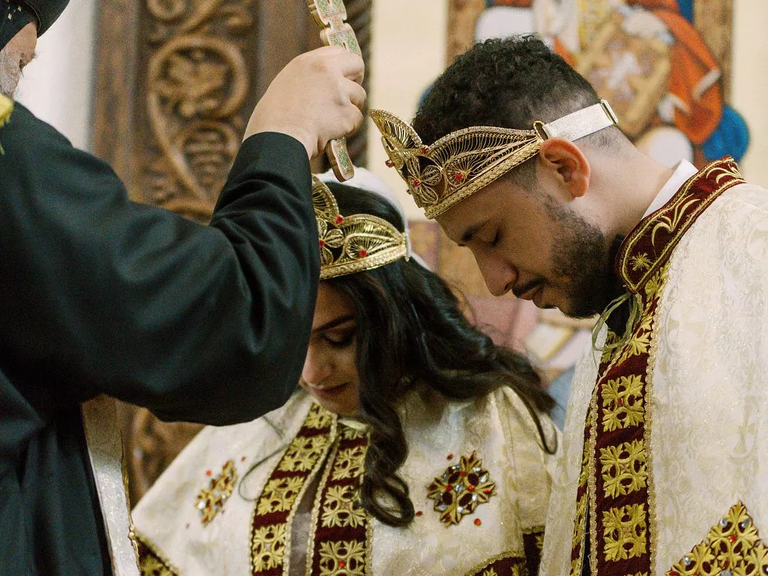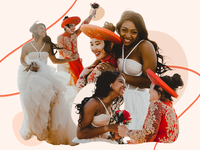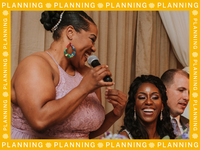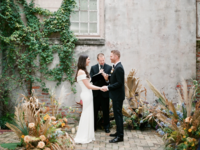How Egyptian Weddings Stay Traditional With a Mix of Modern Updates
While Egypt may conjure images of pyramids and ancient royalty, this country has so much more cultural significance beyond these icons. Egyptian wedding traditions, for starters, involve many years of customs and practices that have stood the test of time. Though they are unique is some ways, in others they're similar to other wedding traditions across the world. Let's read more about how Egyptian weddings uphold heritage while mixing in some modern details.
Ancient Egyptian vs Modern Egyptian Wedding Traditions
Historically, Egyptian weddings were arranged based on families' financial statuses, or they met through their church, family or friends. A groom will ask for a bride-to-be's blessing from her family, before entering into a public declaration of engagement called Je Peniot.
During Je Peniot, families will consider which traditional Egyptian customs they want to honor, the mahr and/or shabka. Mahr, or dowry, is the payment from a groom-to-be to his bride-to-be's family. Shabka is a gift of gold and precious gems that a to-be-wed presents to their betrothed.
When both families agree on terms, they'll read the Yekteb Ketaboh, which is the marriage contract with all the details of the mahr and shabka. The gathered families will seal the contract through this process and then read scripture to the couple. Finally, it's then time to set the engagement date.
Egyptian Wedding Attire
Some Egyptian couples opt for traditional attire, while others mix in some modern elements. For brides, they may choose a white wedding dress or a jewel-toned dress. No matter the style of dress, however, brides typically wear veils as a symbol of modesty.
Grooms have the option of a black suit or tuxedo, or perhaps ceremonial ethnic attire. Some couples will have multiple ceremonies to honor traditional customs, or change clothing during their big day.
Egyptian Wedding Guest Attire
Wedding guests at an Egyptian wedding aren't typically limited in what they can wear. As a rule, anything seen as dressy or semi-formal attire is acceptable. Try wearing a nice, colorful dress or suit. However, shorts are seen as undergarments in Egypt, so it is best to leave those at home.
Egyptian Prewedding Traditions
Egyptian couples often have engagement parties thrown for them, but it can be more extravagant than a typical Western one. The bride's family will host it in either her home, a hotel or a fancy restaurant where families and close friends from both sides can join. It involves elaborate decor, entertainment and even a feast where the shabka is presented. After this party, the spouses-to-be may even start searching for their new home together. However, even once a marriage has been arranged, the two are not allowed to meet alone without a chaperone.
The night before the wedding is the Laylat Al-hinna, or "night of henna party." One of the most important Egyptian wedding traditions, this is when all the women gather for the bride to decorate her hands and feets with intricate, traditional henna designs. The bride is often adorned in a beautiful pink dress, made of cotton or silk, and there is much singing and dancing throughout the night. In fact, this tradition dates back thousands of years and is practiced to bring happiness and good fortune to the happy couple.
Egyptian Wedding Ceremony
An Egyptian wedding ceremony usually begins with the bride and groom's arrival at the venue. There, the procession awaits. Wedding guests will have decorated their cars with ribbons and other decorations on display outside the venue, while performers (such as drummers and belly dancers) welcome the couple.


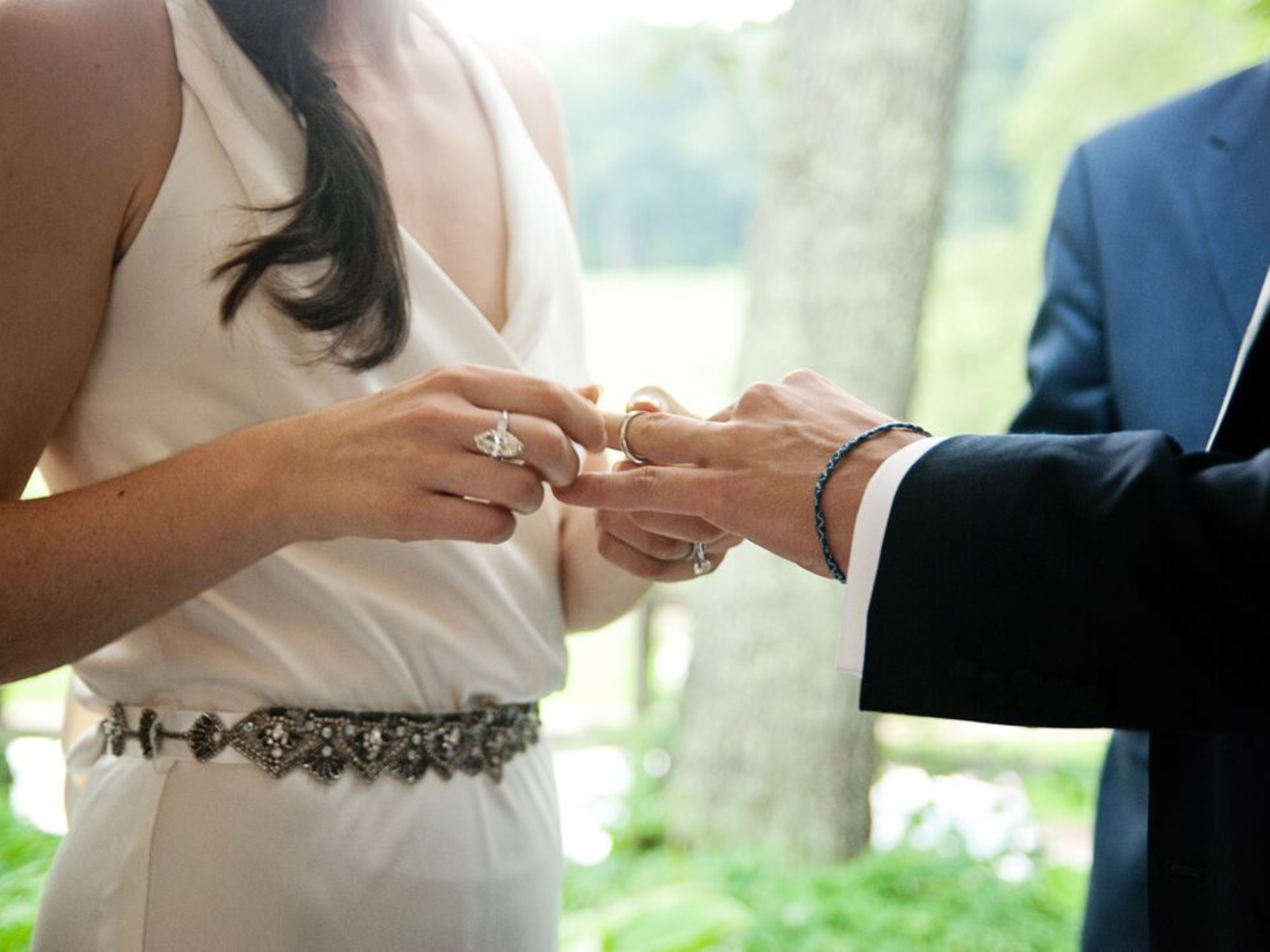
After the couple make their way through the procession, they're met by a Coptic bishop or priest who conducts the ceremony. It usually lasts around 45 minutes to an hour, and the order of events is as follows:
Hymns and Prayers
Bible Readings
Ring Exchange
Anointing with Holy Oil
Blessing of the Crowns
Priest Admonition
Egyptian Wedding Ring Tradition
You typically won't find diamond rings at an Egyptian wedding. Couples tend to wear simple rings, such as gold or silver bands. When they're engaged, they wear them on their right hands and move to them to their left hands during the wedding ceremony. Rings are thought to symbolize "the perfect circle of a marriage that never ends" in Egyptian culture.
Egyptian Wedding Reception
After the wedding is when the party truly begins. Known as the zaffa, this wedding march is commonly quite loud and lively. The newly-married couple enters the reception hall alongside a group of men singing and playing their drums and trumpets. Meanwhile, all of the women make a zaghrouta, which is a loud, song-like sound to represent their excitement and celebration of the union.
As another part of this wedding march, the father of the bride will ceremonially present the bride to the groom. This is when the groom removes her veil and places a kiss on her cheek or forehead before the procession commences again. The zaffa has plenty of music and dancing, and sometimes even belly dancers. This wedding tradition can last up to an hour or more.
The newlyweds will then spend their evening sitting on a kosha, or raised seating area with an elegant sofa and beautiful, regal-looking decor. Occasionally they will rise to dance, greet their guests and take pictures.
Traditional Egyptian Wedding Music
Music is a large part of Egyptian weddings, and couples will often practice dancing to lead up to their big day. Don't be surprised if the newlyweds have an impressive coordinated dance routine. For guests at Egyptian weddings, this is a great opportunity to find their own future spouse.
Traditional Egyptian Wedding Food, Drinks and Desserts
After the wedding comes the celebrations, which involve delicious food. Egyptian couples typically have an elaborate, multi-layered wedding cake, and the custom is to cut and feed it to each other. The newlyweds will then drink a traditional sweet drink made from fruit and herbs, which is known as Sharbat. (This is somewhat similar to libation ceremonies in many African cultures.)
Traditional Egyptian Wedding Food
Wedding food at an Egyptian celebration is often abundant. Feasts are served in a display of the wealth of the two joining families, and they can include stews, salads, meats, a traditional Egyptian recipe called fattah and sweets.
Egyptian Postwedding Traditions
Egyptian celebrations may not end until the early morning hours. This is when the bride will toss her flower bouquet over her back to female wedding guests, much like in Western weddings. The newlyweds will then exit the venue as their guests shower them with grains, such as rice, to symbolize lifelong prosperity and fertility in their new life together.
Traditional Egyptian Wedding Gifts
It's common for wedding guests to gift money to the newly married couple, but one custom spins this in an interesting way. Called nuqtah, guests will discreetly push money into a bride's purse during the wedding reception.
